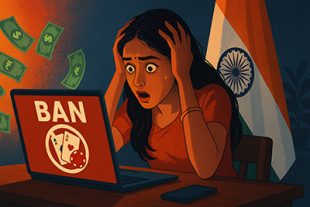India has taken a decisive step toward implementing a uniform framework for online gaming regulation. The Union Cabinet, chaired by Prime Minister Narendra Modi, has approved the Promotion and Regulation of Online Gaming Bill, 2025, designed to ban real-money online games while creating clarity in a rapidly expanding industry.
Legislative Push for Regulation
The bill, introduced in the Lok Sabha by Union Minister for Electronics and Information Technology Ashwini Vaishnaw, immediately drew opposition protests, briefly disrupting proceedings chaired by PC Mohan. The measure represents the country’s first attempt to establish national oversight in the online gaming sector, which until now has operated under a patchwork of state-level rules.
According to the draft legislation, a game will be considered an online money game if it involves paying fees, deposits, or other stakes with the expectation of financial returns. Significantly, the bill makes clear distinctions between such games and eSports or social gaming platforms, which are not covered by the prohibition.
MeitY Secretary S Krishnan emphasized that the decision addresses social and public safety concerns, stating, “This is a societal decision.” He explained that the intent is not only to restrict harmful practices but also to recognize the creativity and growth potential of segments like eSports, which the government plans to support through regulated channels that do not involve monetary incentives.
Penalties and Oversight
Under the proposed law, operators, advertisers, and financial intermediaries involved with online money games could face strict penalties. Offenders may be sentenced to up to three years in prison or fined up to ₹1 crore (approximately $120,000), while promoters and advertisers risk up to two years of imprisonment and fines of ₹50 lakh. Financial institutions that process transactions related to such games will be subject to similar penalties.
Repeat offenders will face harsher consequences, with imprisonment terms extending up to five years and significantly higher fines. Importantly, players themselves will not face prosecution, as the legislation views them as victims of exploitation rather than perpetrators.
The bill also calls for the creation of a regulatory authority to categorize games, ensuring clarity for operators, players, and law enforcement. This body will oversee registration and compliance, as well as determine whether a particular game qualifies as an online money game.
Industry and Public Reactions
The government maintains that the bill prioritizes public protection, citing rising concerns over gambling addiction, fraudulent platforms, and mental health issues. Public health voices, such as Preetha Reddy, Executive Vice Chairperson of Apollo Hospitals, expressed support for the measure on X (formerly Twitter): “The new Online Gaming Bill is more than regulation, it is protection. Online money games have left children and youth vulnerable to exploitation and serious mental health risks. This step puts wellbeing first, ensuring our future generations grow with balance and dignity.”
However, industry representatives have warned that the legislation could have far-reaching economic consequences. Organizations, including the All India Gaming Federation (AIGF), E-Gaming Federation (EGF), and Federation of India Fantasy Sports (FIFS) issued a joint statement warning that the law could “destroy over 2 lakh jobs, result in over 400 companies shutting down, and weaken India’s position as a digital innovator.”
These groups also cautioned that banning regulated platforms may drive millions of users toward illegal offshore operators and unregulated markets, increasing risks of fraud and money laundering. They highlighted that the online skill gaming sector has grown into a ₹2 lakh crore industry, contributing around ₹31,000 crore in annual revenue and generating over ₹20,000 crore in taxes. The sector, expanding at a rate of 20% CAGR, was projected to double by 2028, with India’s gamer base rising from 36 crore in 2020 to over 50 crore in 2024. Foreign direct investment in the industry had already surpassed ₹25,000 crore by mid-2022.
If Parliament passes the bill, it will become India’s first comprehensive national framework for online gaming, balancing support for safe digital entertainment while imposing stringent penalties against harmful real-money gaming platforms.
Sources: Gaming Bill: Cabinet approves legislation to regulate online real money gaming platforms; to be tabled in Lok Sabha on this day, timesofindia.indiatimes.com, August 20, 2025.


